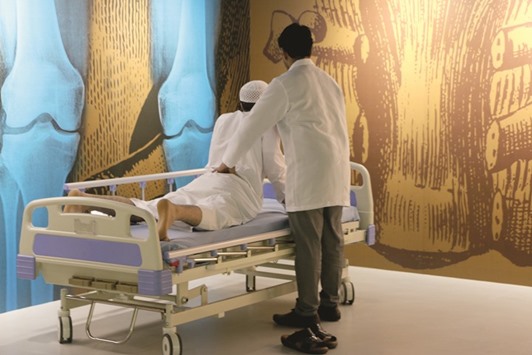The creative 4D imagery of human organs and their anatomy described in the light of the Qur’an, complemented by medical practitioners providing free specialised check-up, in Katara Cultural Village is attracting huge attention of the visitors.
Held as part of the Ramadan Festival by Katara Cultural Village Foundation, ‘The Human Creation in Holy Qur’an’ features different specialised check-up points based around each organ in the exhibition.
The visitors will discover the wisdom of creating human beings as described in the Qur’an through various events and activities presented by Katara.
The building 19 of Katara hosts a physiotherapist and exhibition of the anatomy of body skeleton, bones and joints. A professional physiotherapist from Naseem Al Rabeeh Medical Centre, Muzafar Mahamood is providing free check-up and medical advice to a number of people visiting his booth every night.
“We are mainly advising people about their postures and their daily routine postures. We are also giving them tips on how to avoid back or shoulder pains by maintaining certain postures,” Mahamood tells Community at his station, where he has all the necessary equipment including a bed to examine the visitors coming to him.
“We also have [the facility for] almost all weight exercises, like dumbbells, stress ball and some pain relieving modalities. We do not treat here. We advise them what exercises they can and cannot do. If they are going to gym then what type of exercises should they do in what form,” says Mahamood.
Most of the people visiting him have been concerned about their weight. So he would take their weight and height measurements and advise them on how much weight they need to reduce, based on their Body Mass Index (BMI).
Some people, he says, have come up to him with complaints about pain in their hands. If the pain is in the elbow region, it can be tennis elbow. Mahamood suggests them taking some safety measures, and to consult an orthopaedic doctor if the measures do not work.
Many people have come with the complaints of back pain that goes all the way to their legs. “We just advise them to go meet the doctor and take proper treatment. We cannot advise them any exercises or do any physiotherapy sessions as they need proper medication,” says Mahamood.
In Qatar, he says, most complaints they receive are cervical and Lamba strains, usually caused at work. These stresses in the neck and back usually come from the sitting postures of the people at their jobs.
They do not take regular breaks and in these cases, the treatment will take time to show results. The results though have been “really good”. There are many handy exercises that you can do during your time at the work station to avoid getting such problems.
These include taking regular breaks from sitting in one particular posture and doing some simple neck, hands and finger exercises to relax the muscles. These are small 1-2 minute breaks that can help prevent such pain problems.
“These kinds of problems do not occur just all of sudden. They usually build up over a period of time. Once they appear, people take treatment and the problem subsides but as soon as they go back to the same sitting posture, it comes back. So you have to be careful and regular with the exercises,” says Mahamood.
In Qatar, and in the entire GCC region in general, he adds it is mandatory to advise people on their sitting postures at work.
“We can tell people about some exercises and tips. But if they need treatments, we are suggesting them to get to us at the hospital or any other medical practitioners so that they can be given proper medical attention,” says Mahamood.
Many of the people who are advised to go to the doctor say they will do so after Ramadan, said the doctor. Some, however, decided to seek immediate medical attention.
The check-up points will remain open from 7pm to 11:30pm every day during Ramadan at Katara.

AT WORK: Mahamood advises people on their daily work postures and examines them for any complaints about back or neck pain.
